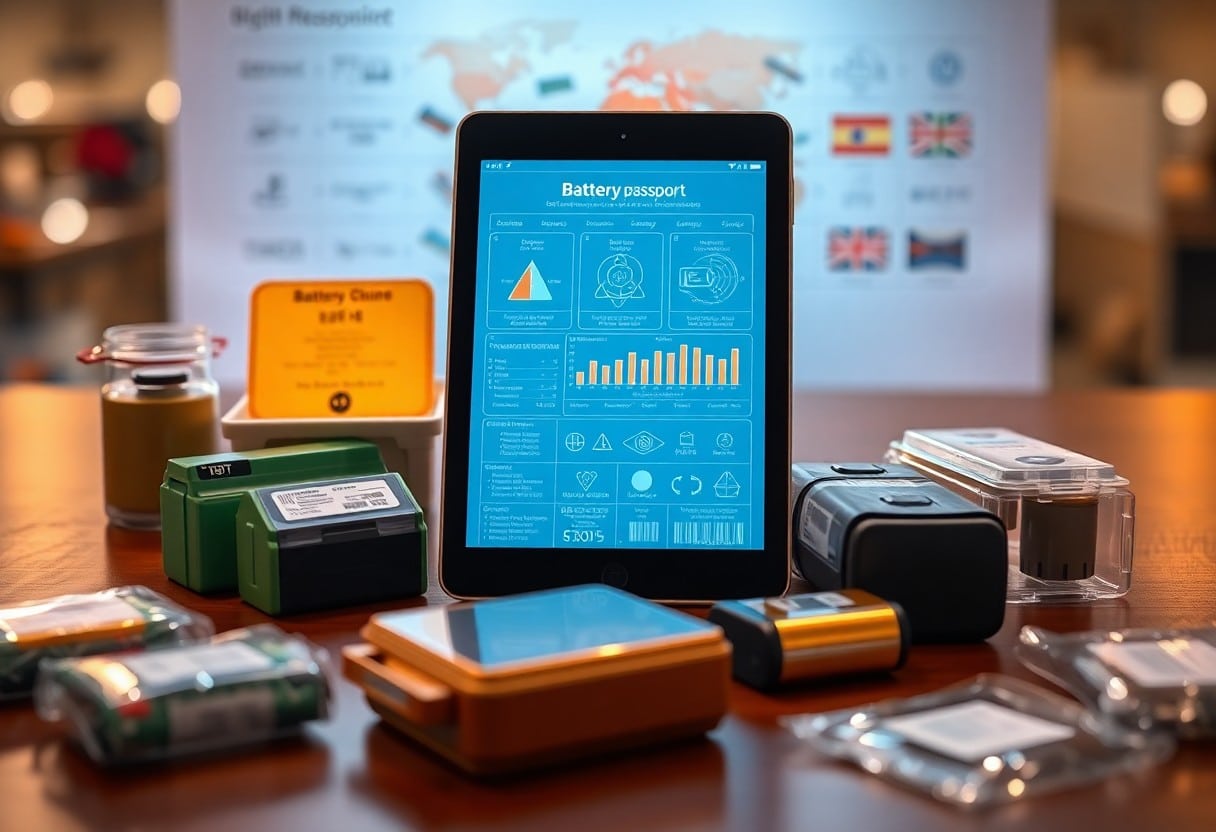You might find yourself wondering how a digital battery passport can enhance supply chain transparency and ensure compliance in today’s fast-paced market. This innovative concept serves as a comprehensive digital record, containing vital information about a battery’s lifecycle, from sourcing to recycling. By implementing this technology, you can track components, verify sustainability claims, and adhere to regulatory requirements more efficiently. This blog post will examine into the implications of digital battery passports for your supply chain, revealing how they can promote accountability and foster trust among stakeholders.
Decoding the Digital Battery Passport
What It Is and How It Works
The Digital Battery Passport serves as a comprehensive digital identity for lithium-ion batteries, encapsulating pertinent data about their production, composition, lifecycle, and recycling processes. Utilizing blockchain technology, this passport enables stakeholders across the supply chain—from manufacturers to recyclers—to access verified information at any stage. This visibility not only ensures adherence to regulatory frameworks but also facilitates informed decision-making regarding battery usage and disposal.
The Role of Data in Battery Lifecycle Management
Data plays a pivotal role in optimizing battery lifecycle management, driving efficiency and sustainability. Through the Digital Battery Passport, you gain insights into crucial metrics such as performance history, degradation patterns, and end-of-life options. This information empowers manufacturers to enhance product designs, develop recycling strategies, and promote circular economy initiatives.
By leveraging data analytics, companies can make proactive decisions informed by real-time data. For instance, tracking the state of health (SOH) of batteries can help identify when they should be refurbished or recycled rather than discarded. This approach reduces operational costs and minimizes environmental impacts, reinforcing your commitment to sustainability. Integrating predictive analytics into lifecycle management not only improves battery performance but also fosters consumer trust by ensuring that manufacturing processes align with sustainability goals.

Enhancing Supply Chain Visibility Through Digitalization
With the integration of digital technologies, supply chain visibility has reached unprecedented levels. By leveraging digital battery passports, stakeholders can access real-time data regarding every component’s journey, from production to end-user. This transparency enables immediate identification of issues such as delays or compliance breaches, giving companies the ability to make informed decisions swiftly. As a result, your supply chain not only becomes more efficient but also fosters greater trust among partners and consumers.
Real-Time Tracking and Monitoring
Real-time tracking through digital battery passports allows you to oversee the entire lifecycle of batteries in your supply chain seamlessly. Utilizing IoT devices and blockchain technology, each battery’s progress can be monitored consistently, ensuring that you are alerted to any potential disruptions or irregularities instantly. This capability empowers you to act swiftly, minimizing downtime or losses while enhancing overall operational efficiency.
Improving Stakeholder Accountability
Stakeholder accountability significantly improves with the employment of digital battery passports. By providing an immutable record of each battery’s journey, every participant in the supply chain becomes responsible for their role. This encourages companies to uphold compliance and quality standards, as any deviation from established protocols is easily traceable. Consequently, you drive improvements in ethical sourcing and manufacturing practices while enabling better risk management across the supply chain.
A notable example can be seen in the automotive industry, where companies increasingly rely on digital battery passports to ensure compliance with environmental regulations and safety standards. Manufacturers and suppliers share a unified view of product data, compelling them to adhere strictly to the best practices for transparency. This collaborative environment not only enhances individual accountability but also builds a culture of integrity and sustainability throughout the supply chain, reinforcing your brand reputation in a competitive market.
Compliance Revolution: Meeting Regulatory Demands
Adapting to evolving regulatory landscapes is now paramount for businesses in the battery supply chain. The Digital Battery Passport streamlines this process by embedding compliance protocols within its digital framework, providing a real-time compliance verification system. With automated reporting and traceability features, you can ensure a seamless alignment with local and international regulations, thus facilitating compliance audits and improving operational efficiency.
Aligning with International Standards
Integrating the Digital Battery Passport allows you to comply with various international standards, including those established by the European Union’s Battery Regulation. By ensuring that your products meet these benchmarks, you enhance market access and bolster your organization’s credibility in the global arena, paving the way for smoother transactions and partnerships.
Reducing Penalties and Liabilities
Implementing a Digital Battery Passport effectively minimizes your risk of incurring substantial fines and legal repercussions. Compliance with regulations decreases the likelihood of penalties, which can reach into millions depending on the violation’s severity. By maintaining thorough documentation on battery sourcing, recycling, and end-of-life processes, your organization is better positioned to defend against compliance breaches.
Focusing on compliance not only avoids penalties but also fosters a culture of accountability within your organization. For instance, the International Energy Agency estimates that non-compliance could result in fines averaging 10% of annual revenue for companies in the battery sector. Utilizing a Digital Battery Passport empowers you to collect and present imperative data at a moment’s notice, reinforcing your commitment to transparency and responsible practices that resonate with stakeholders and consumers alike. As regulatory scrutiny intensifies worldwide, being proactive about compliance becomes a competitive advantage, ensuring that your business remains resilient in a challenging landscape.

The Business Case for Embracing Digital Battery Passports
Digital Battery Passports represent a significant opportunity for companies looking to enhance their supply chain practices. By adopting this innovative approach, you tap into improved transparency, traceability, and compliance, aligning your business with the growing regulatory demands and expectations of consumers for greater sustainability. This commitment is not just a trend; it’s increasingly critical for maintaining market relevance and meeting the standards set by industry leaders.
Cost Savings and Operational Efficiencies
Implementing Digital Battery Passports can lead to substantial cost savings and increased operational efficiencies. By streamlining processes related to battery lifecycle management, you can reduce administrative burdens and minimize waste. For instance, advanced data collection and analysis enable better forecasting of battery performance and lifecycle, allowing you to optimize inventory levels and reduce excess stock, ultimately lowering costs.
Gaining Competitive Advantages in Sustainability
Embracing Digital Battery Passports positions your business as a leader in sustainability practices within the industry. Consumers increasingly prefer brands that demonstrate environmental responsibility. By providing verifiable data on the sourcing, use, and recycling of battery materials, you bolster your brand’s credibility and attract eco-conscious customers. As regulatory pressure mounts, compliance with environmental standards through digital passports will not only mitigate risks but also enhance your market standing.
Evidence shows that organizations making strides in sustainability, particularly in the battery sector, can gain significant traction in brand loyalty and market share. For example, companies that provide detailed product disclosures, like those enabled by Digital Battery Passports, report up to a 20% increase in consumer trust and preference. By successfully communicating your commitment to sustainability, you aren’t merely responding to consumer demand; you’re also positioning your business to leverage future growth opportunities while simultaneously driving industry-wide shifts toward more responsible practices.

Future Trends: The Evolving Role of Technology in Battery Supply Chains
Emerging technologies are reshaping battery supply chains by enhancing traceability, improving efficiency, and promoting sustainability. Blockchain integration allows for secure, immutable records of every stage in the battery lifecycle, while IoT devices gather real-time data on battery performance and usage. These advancements not only facilitate compliance with regulatory standards but also foster trust among stakeholders. As you embrace these technologies, you position your company at the forefront of a supply chain revolution that prioritizes transparency and accountability.
The Intersection of AI and Supply Chain Integrity
Artificial intelligence is transforming how supply chains operate by enabling predictive analytics and automated monitoring. By leveraging AI algorithms, you can gain insights into demand forecasting, inventory management, and even potential disruptions within the supply chain. This proactive approach allows for enhanced decision-making, ensuring that your operations remain efficient and compliant with regulatory standards as you navigate the complexities of battery sourcing and distribution.
Potential Challenges Ahead
While the integration of digital passports and advanced technologies promises significant benefits, several challenges must be addressed. Data privacy concerns, the need for standardized protocols, and the risk of technological obsolescence could hinder the full realization of these advancements. Additionally, the reliance on technology necessitates continuous investment in infrastructure and workforce training, presenting a barrier for smaller companies looking to stay competitive.
As companies like yours explore the potential of digital battery passports and advanced tech in supply chains, be mindful of the obstacles that accompany these innovations. Ensuring data security becomes paramount as sensitive information is shared across platforms. The absence of universally accepted standards might lead to fragmentation, complicating interoperability among different stakeholders. Moreover, the ever-evolving nature of technology requires constant vigilance and adaptation, amplifying the need for regular updates and employee training. Addressing these challenges head-on will be imperative for maintaining compliance and integrity within your supply chain.
Final Words
With these considerations, you can appreciate how a digital battery passport can significantly enhance supply chain transparency and compliance. By providing detailed information on the lifecycle, sourcing, and recycling of battery materials, it empowers you to make informed decisions while ensuring that your operations align with industry regulations and sustainability goals. Embracing this technology is not just about compliance; it positions you as a leader in responsible sourcing and environmental stewardship, ultimately enhancing your brand’s reputation and building trust with customers and partners alike.



